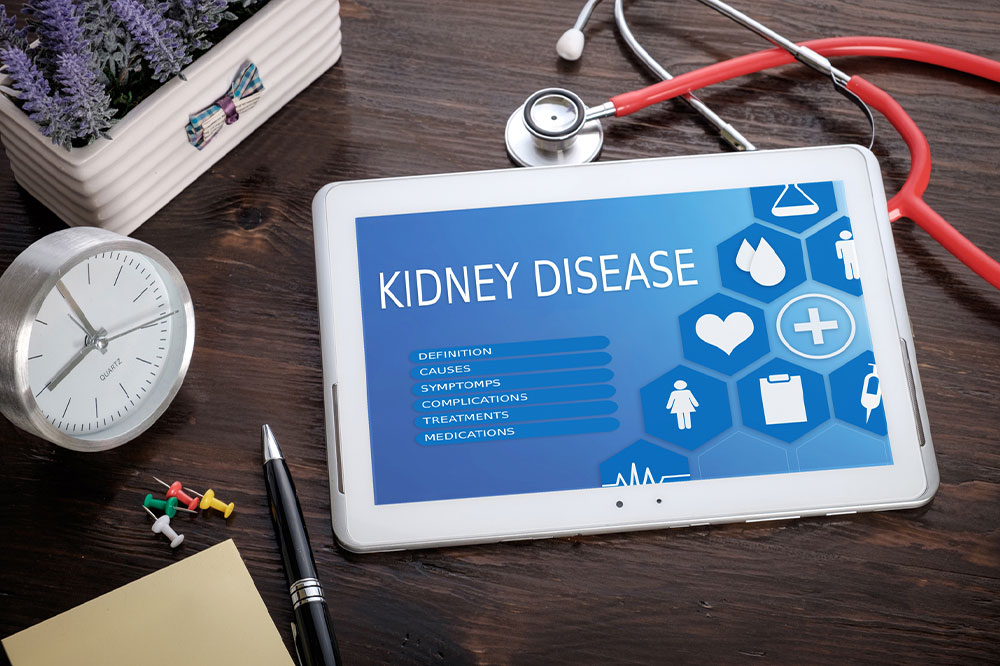
Kidney disease – Signs, causes, and more
The kidneys are vital organs of the body and function to remove waste from the blood and extra fluid through the urine. Conditions that pertain to diseases of these organs are normally linked to the build-up of waste products and extra fluid in the body. Early diagnosis and management are critical for preventing the condition from worsening while reducing the risk of kidney failure. In this article, we highlight the essential aspects about kidney disease.
1. Signs
Kidney disease is often referred to as the silent disease as it often shows a few symptoms, such as
Fatigue
Anemia is a common complication in people with kidney disease and can cause weakness and fatigue.
Swelling in the face, hands, or ankles
As the kidneys cannot remove extra fluid, it builds up in the body and causes swelling in the face, ankles, or hands.
Poor appetite
A severe build-up of wastes from reduced kidney function can result in poor appetite.
Dry and itchy skin
When the kidneys are unable to maintain a balance of nutrients and minerals in the blood, it makes the skin dry and itchy.
Trouble sleeping
People with kidney disease face difficulties when it comes to sleeping habits. Few studies have also found a link between sleep apnea and chronic kidney disease.
Muscle cramps
A sign of poor kidney function is muscle cramps in your legs due to electrolyte imbalances.
Breathlessness
The extra fluid in the body and anemia can leave a person with reduced kidney function short of breath.
Trouble concentrating
Anemia related to kidney disease can lead to memory problems or trouble with concentration.
Foul breath
Toxins in the blood can make your mouth smell and is a sign you need to pay attention to.
2. Causes
The main causes of kidney disease include
Diabetes
Diabetes is a common culprit for kidney disease. Over time, high blood sugar levels can damage the kidneys.
High blood pressure
This issue impacts the blood vessels including those that are in the kidneys thus affecting kidney function.
Glomerulonephritis
Glomerulonephritis is a condition that causes damage to the glomeruli, the filtering units inside the kidneys.
Polycystic kidney disease
This inherited condition causes fluid-filled cysts to grow in the kidneys reducing their ability to function.
Pyelonephritis
This urinary tract infection can damage the kidney if it occurs several times.
Lupus Nephritis
It is an autoimmune disease that causes inflammation of the kidneys and affects their functioning.
3. Risk factors
The risk of being affected by kidney disease increases with these factors:
Age
People who are over 60 years of age have an increased risk of developing kidney disease.
Race and ethnicity
There is a higher chance of developing kidney disease in people who are of African-American, Hispanic, Latino, Native American, and Asian-American lineage.
High blood pressure
People who have high blood pressure are at an increased risk of developing kidney disease.
Diabetes
Diabetic people have an increased risk of developing kidney disease.
Heart problems
The chances are higher in people who have had a stroke or heart attack or have other cardiovascular diseases.
Family history
If there is a family history of kidney disease, the risk is always greater.
4. Diagnosis
The diagnostic tests conducted for kidney disease may include
Urine tests
Urine tests look for the amount of protein and blood in the urine.
Blood tests
These tests check how well your kidneys are filtering blood and removing waste products.
Imaging
Imaging tests are done to view the size and structure of the kidneys. These tests may include ultrasound, magnetic resonance imaging (MRI), computed tomography (CT), or cystography.
Biopsy
In the investigation of kidney disease, a biopsy may be done to find out the cause of kidney issues.
5. Treatment
These treatment options can help ease the symptoms and reduce complications due to diabetes:
Dialysis
Dialysis is performed when kidney function cannot keep up with the waste removal. This procedure uses machines to remove waste products from the body.
Kidney transplantation
A healthy kidney is placed into the body to replace the failed kidney. The transplantation can come from either living donors or deceased donors.
6. Prevention
Making healthy lifestyle choices can prevent kidney disease as well as delay kidney failure. These choices may include
Well-balanced nutrition
Including fruits and vegetables, legumes and grains, and lean meat in daily meals can help. Also, it is best to eat foods low in salt and sugar.
Stay hydrated
Drink plenty of water and avoid consumption of sugary drinks.
Exercise regularly
Dedicate at least 30 minutes for five or more days of the week to exercise. You can try low-impact exercises such as walking, bike riding, swimming, or aerobics.
Check your blood pressure
Get your blood pressure checked regularly.




